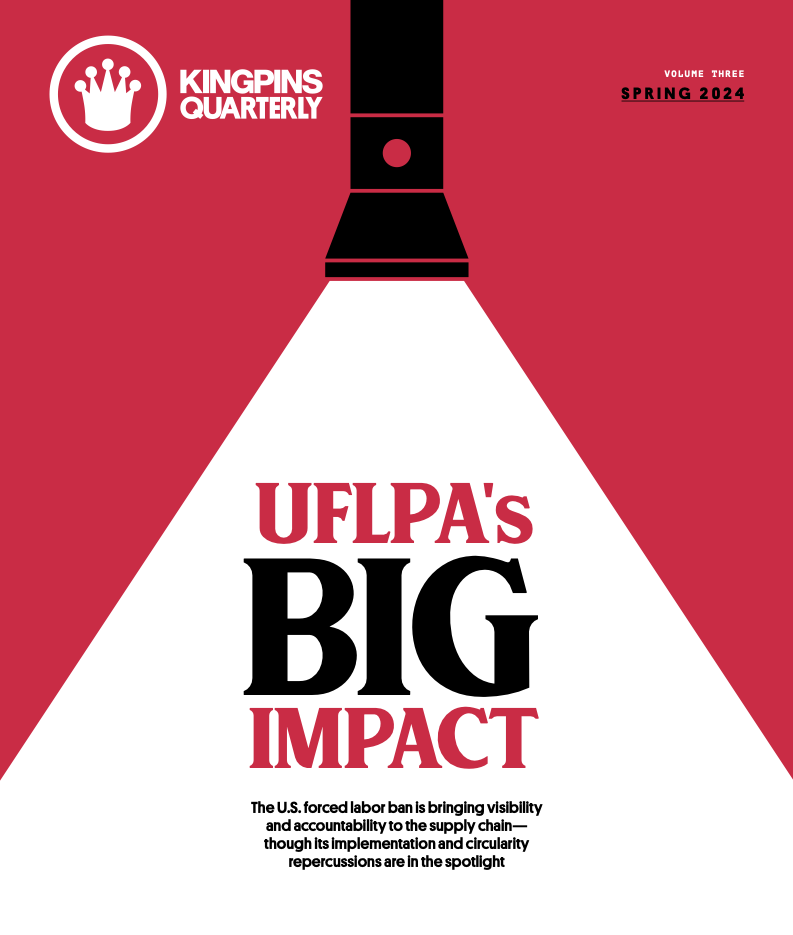Amsterdam, that low-lying and wildly permissive jewel of the north, has had its soggy foundations rocked by a recent string of bankruptcies. Once regarded as the denim world’s unrivaled European capital, Amsterdam has seen a rash of store closures, and some of its iconic homegrown brands have, in recent years, teetered on the edge of insolvency. G-Star Raw, Scotch & Soda, and Kings of Indigo have all run into severe financial difficulties, raising questions about the future of the Dutch denim industry.
That future was once blindingly bright. The love for denim runs deep in the Netherlands, and, though the population is relatively small, the Dutch take an outsized share of the European denim market. Famously practical, they don’t see themselves as especially fashionable, but they don’t shy away from spending money on clothes. According to Adriano Goldschmied, co-founder of Diesel, “The Dutch have jeans in their blood. Denim fits with their mindset.”
Jos van Tilburg was the first to put Dutch denim on the map. In 1989, he founded G-Star (formerly Gapstar) in Amsterdam as the home of aggressively contemporary European denim designs. In 1996, G-Star became one of the first brands to re-introduce raw denim to Western consumers, which catapulted the brand (and Amsterdam) onto the global stage. By the turn of the century, the excitement surrounding the denim industry in the city was palpable.
It was the dawning of a Dutch Golden Age of denim. The next two decades would see a mixture of established brands and newcomers jostling for room along the crowded canals. Drawn to the roots in the city, establishing design studios that could take advantage of Amsterdam’s seemingly inexhaustible supply of talented young creatives from homegrown denim start-ups, including Denham the Jeanmaker, Benzak Denim Developers, Kings of Indigo, and Tenue de Nîmes.
By 2012, The New York Times was calling Amsterdam “a bright star in the global denim firmament” that found itself at “the center of the European jeans world.” The occasion for the profile was the opening of the Jean School, a first-of-its-kind denim design program that would serve as an incubator for plucky denim entrepreneurs and help provide a pipeline of educated talent for denim brands with headquarters in the city. The Jean School was established in Denim City, an innovation campus with an extensive denim archive, a state-of-the-art laundry facility, and guest lectures from denim industry luminaries, and quickly became the center of a vibrant, youthful and diverse denim design scene.
Mariette Hoitink and James Veenhoff, the school’s co-founders along with ROC Amsterdam, played a powerful role in turning the industry’s eyes towards Amsterdam. Their House of Denim, founded in 2009 with the support of key industry stakeholders, provided crucial early leadership in efforts to make both the local and the global denim industry clean up their act. Hoitink and Veenhoff had a powerful ally in City Hall. They proposed a breakfast that was hosted by Amsterdam’s mayor Eberhard van der Laan at his home in March of 2013. For the first time, founders and representatives from some of the most prominent Amsterdam-based denim brands gathered in the same room. Attendees included Jason Denham, Kings of Indigo founder Tony Tonnaer, Patrick Kraaijeveld, representing G-Star, Alex Jaspers, representing Scotch & Soda, and Ludo Onnink, representing both Calvin Klein and Tommy Hilfiger.
At the top of the agenda was a plan, spearheaded by Hoitink and Veenhoff, to guide the denim industry towards a more sustainable future. There was widespread agreement that more R&D on sustainability was required, and there were calls for a trade show that would help further Amsterdam’s reputation as a pillar in the international community.
The trade show that members of the industry wanted materialized almost immediately. Andrew Olah, founder of Kingpins, a denim-focused trade show that began in New York in 2004, established a European version that has, ever since, brought the denim supply chain together in Amsterdam twice annually. The following year, Denim Days, a popular denim consumer festival and fair, was added to the calendar, drawing some of the world’s most passionate denim lovers and emerging brands.
For years, Amsterdam’s top-of-the-heap status seemed untouchable, but by the end of the decade, something had changed. One of the first red flags was G-Star, which, beginning in 2020, started reducing its retail footprint as a response to the Covid slowdown and the movement away from brick-and-mortar shopping. Hardest hit was the brand’s Australian presence, where, following bankruptcy filings, all stores closed. Chapter 11 filings in the United States followed, resulting in more store closures. The move seems to have set G-Star back on course. Recognizing the shifting landscape of denim, it now offers free repair services in the Netherlands, and it has attempted to capitalize on fast-moving trends, releasing an NFT in 2022 and a series of AI-generated designs earlier this year.
G-Star’s financial troubles in its overseas markets didn’t seem to point to troubles unique to the Netherlands. The same cannot be said for Scotch & Soda. The Dutch brand had enjoyed a record-setting year in ‘21/’22, with revenues approaching 350 million euros and three-dozen new stores opening around the world. On their home turf, though, trouble was brewing. Over the 2021 holiday season, a host of financial pressures caused the brand to shutter several of its Dutch locations. The move caused a significant dip in revenue, which only compounded the issues. The resulting bankruptcy, which only affected Scotch & Soda’s Dutch division, rang alarm bells in Amsterdam. There were more indicators that the Dutch denim industry was struggling. Just last year, Amsterdam- born sustainable denim brand Kings of Indigo announced it had been unable to secure financing. Citing pressures similar to those that drove G-Star’s and Scotch & Soda’s issues, the company filed for bankruptcy, hoping for an injection of new capital that could help it restart on more secure footing. Luckily, the brand was pulled back from the brink by Kathrin and Sebastian Proft, owners of a trio of sustainable fashion labels in Germany and Austria.
Of course, it is not just Dutch brands that have struggled. A long list of brands, including True Religion, Diesel, The Flat Head, and Lucky, have all been in and out of bankruptcy courts, and the list of brands that have just barely held together at the seams is longer still. Are the struggles of Amsterdam’s homegrown denim brands yet another casualty of the global decline of brick-and-mortar shopping and still-rippling effects of the Covid-driven slowdown, or is this a uniquely Dutch problem that reflects uniquely Dutch challenges? Is Amsterdam a bellwether for the global denim industry, or are distinctly local issues behind the slew of bankruptcies?
Silvia Rancini, founder of Amsterdam’s recently shuttered Denim Window, lays some of the blame at the feet of Dutch consumers. Rancini cited the post-Covid line-ups she saw outside retailers like Primark, Pull & Bear, and Stradivarius as the reason she decided to close her denim design hub. Dutch consumers, she said, have less spending power, but they “are not willing to buy less but better.” This could spell issues for homegrown Dutch denim brands, which have by and large attempted to produce a superior product ethically and sustainably—with a price tag that reflects their investments in technology and labor.
The issues driven by consumer preferences that Rancini describes aren’t unique to Amsterdam. The shifting retail climate has been the source of much hand wringing in the garment industry, and the denim industry is no exception. As goes the denim industry, so go Amsterdam’s denim brands. Andrew Olah of Kingpins said the industry both in Amsterdam and around the world is resilient. Some may sink below the waves, but, he says, “those who survive will enjoy the next wave.”
Hoitink said the young designers emerging from the House of Denim talent incubator are showing which way the industry might be heading. There’s an increasing interest in streetwear and couture, and made-to-measure, feeding into the city’s growing number of made-to-measure denim brands, including Lebl Studios, Rare Mabi Jeans, Wallflower and Trinity Williams. All of this points to new kinds of consumers and new expectations for the industry, and established brands will need to adapt to the new era and its new breed of denim consumers.
Amsterdam, said Veenhoff, is as much a denim-centric city as ever, and there aren’t any cities in Europe rising up to supplant Amsterdam as a denim capital. The future of Kingpins Amsterdam and the Jean School are secure, and “the vibe is good,” he said, though he acknowledges it is different as the industry attempts to bounce back. And that’s where these new brands come in. They’re tapping into youth, which Veenhoff said shoppers will resonate with. “Now the question is creativity rather than technological innovation,” he said. “Consumers are asking for something new. It’s more about creating stuff that excites people, makes people feel alive and sexy and free and young and independent.”




